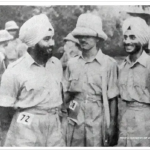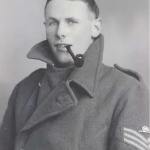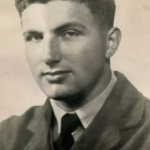Summary
This is the account of a visit by Donald Randall in 1983 to Italy to retrace the route he and George Hunt took during the period September 1943/June 1944 when they were attempting to reach the allied troops in Southern Italy.
He had been captured in North Africa and was imprisoned in P.G. 55/IV Busseto until the Armistice. They began to walk South and were taken in by a woman called Pasquetta who looked after them for around 3 months. When eventually the authorities raided the village they escaped but were caught and imprisoned in Spoleto, Perugia, Arezzo and then Germany where they stayed until the end of the war.
His post war visit successfully reunited Randall with Pasquetta and several others who had helped him during the war.
The full story follows, in two versions. The version in the first window below is the original scanned version of the story. In the second window below is the transcribed version in plain text.
[Digital page 1]
Donald Randall.
Got down from Cremona area to Veletri but went back north again around Rieti and stayed ‘on the run’ until April 1944. Captured again near Spoleto and put in its castle and then after some doubtful weeks to Germany.
[Digital page 2]
Mr Donald Randall. Born London, 7th January, 1920.
Captured North Africa, June 1942. Prisoner of War Campo P.G. 55/IV Busseto, Italy.
INTENTION
To visit Italy in May 1983 with my wife and to retrace, as far as possible, the route taken on foot during the period September 1943/June 1944 when attempting to make contact with allied troops in Southern Italy. To visit Spoleto prison, if this can be arranged, and Pratoianni, a small village which gave refuge en route, and in particular to meet, if possible, any remaining villagers who were involved at great personal risk in affording shelter and food. If too long a period has elapsed, then to place flowers on the graves of those most concerned, i.e. Signora Pasquetta, (surname unknown) and Signor Chiarinelli and his wife.
BACKGROUND
1. At the time of the Armistice in September 1943 I was working on a large communal farm known as “Stralochio” situated north of the river Po from Busseto and south east of Cremona (this is an approximate location).
2. We (see further detail) received a great deal of help in avoiding recapture by German troops from families working and living at Stralochio. For example, an underground pit was dug and camouflaged in order to avoid detection by troops searching the area for escaped prisoners.
Particularly helpful at this time was Maria del Monego, who, I believe, was the elder daughter of the foreman at Stralochio and another woman known as Josefina.
3. In due course it was decided to move South, rather than North into Switzerland. The general route taken is shown on the attached map. Much help was given at a house on the outskirts of Parma at Langhirano, and in many subsequent overnight stops which were usually villages away from roads
[Digital page 3]
or at isolated farms. This was always difficult and dangerous for those giving assistance.
4. Arrived at Pratoianni about two weeks before Christmas 1943. Intended and expected to be able to stay no more than perhaps one or two days, but was taken in by Pasquetta against some local opposition and remained until the allied landing at Anzio (January/February 1944). During the stay in Pratoianni we were also greatly helped by Signor Chiarinelli, whose two daughters, Enis and Tilde, and son, Silvano, were staying with their parents because of the allied bombing of Rieti and to avoid the forced recruitment of young men back into the Italian army that was taking place at the time.
Many other families in the village provided meals or extra food for Pasquetta to cook.
5. Left Pratoianni in January/February 1944 in an attempt to contact troops at Anzio. This proved impossible because of German counter attacks on the beachhead. Stayed in area around Velletri and was given food by local people until the Germans became aware of our presence and it became too dangerous for them to carry food into the woods in which we were hiding. Cassino and also the Anzio front became static, so we retraced steps to Pratoianni and Pasquetta. We stayed until April when our presence became known to local fascist authorities and the village was raided early one morning. We managed to escape, but Pasquetta and her family were subjected to threats of violence which included the taking away of her husband and son. Finally I believe most of their remaining food was confiscated.
6. We therefore decided to walk back to northern Italy and into Spain via southern France in the hope of relief and to keep on the move, as it was becoming increasingly difficult to stay any length of time in one place. We were waylaid on the outskirts of Spoleto by a group of armed fascists in civilian clothes and imprisoned in the old fortress of Spoleto for about one month.
[Digital page 4]
Accommodation, which was below ground and very old, was occupied by a group of Italian partlsans, one of whom had a fine tenor voice and frequently sang Italian songs at the door of our cell. We were threatened almost daily with the possible consequences of having been arrested in civilian clothes unless we made known the identity of those who had helped us during the previous months. We were subsequently moved to Perugia prison for further interrogation and in due course transferred to Arezzo and then on to Germany to work in a lignite mine until the end of the war.
7. Just prior to my marriage in 1949 I returned to Rieti and Pratoianni and visited Tilde and Enis Chiarinelli [address redacted]. Enis was married and had a young baby. Much hospitality was given in Rieti by families who I had known in Pratoianni, but I was particularly impressed by the welcome given by the welcome given by Enis and her husband (Photo A). Photo B is of Enis and her husband plus a friend of Enis’ and myself.
8. After a few days in Rieti I visited Pratoianni and was met by Pasquetta who knelt before me and thanked God for my safe deliverance. I stayed with Pasquetta, her husband and son, Dominic, (then 18 years of age). I took a number of photographs. Photo C shows Pasquetta and her husband, and also a family opposite who were most helpful, (I believe their name was Tomasetti), and whose elder daughter Eriquetta, had supported Pasquetta in her offer of assistance. Photo D shows a group of villagers at work on a combine harvester. The man on my left with his hand on my shoulder is Signor Chiarinelli, who, with his wife and family of Enis, Tilde and Silvano, often provided us with a meal and offered comfort and encouragement during that bleak winter of 1943/44.
9. Photo E shows a group of villagers and children at the village fountain. Most of the adults were known to me, except the fat gentleman, who I had never seen before but he was obviously a member of the village.
[Digital page 5]
FURTHER DETAIL
During the period 1943/44 I was accompanied by Mr George Hunt, now aged 72, and living at Portsmouth, England.
[Photograph of Spoleto Prison]



